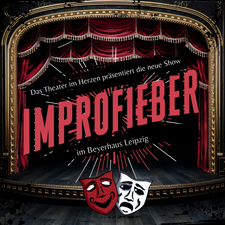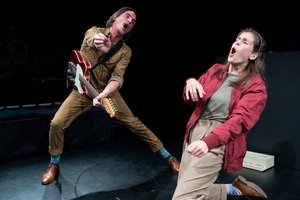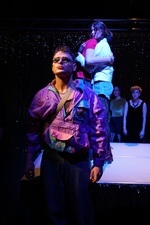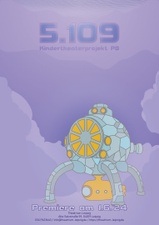Heartbreak Hotel
In the organizer's words:
A shared flat in a shabby house in a gray Berlin. Six people live here, waiting for life to begin, to pick them up and sweep them along, for the stagnation to finally come to an end.
But the waiting is also linked to expectations that we want to question. We want to tell the stories of restless and unstable people who have yet to find out what life has in store for them. All six of these people come from different parts of the world - different life situations - but they have all been stuck in this situation for what feels like an eternity, they can no longer remember who they once were or what they wanted to be, all they know is that they want to move on.
Our protagonist Ganin finds a way to free himself, because instead of being drawn forward, into the future, he first takes refuge in his memories of his first great childhood love, triggered by a photo of his neighbor's wife. He relives this love, makes plans to start a new life with her and thus frees himself from his resignation and depression.
Love is the second aspect that binds our characters together, because waiting for love is linked to waiting for life to begin. One is waiting for his wife, the other wants to follow his daughter but is thwarted by German bureaucracy, the next is unhappily in love while hope abandons her.
A dreamlike world of waiting is narrated, which is interspersed with a touch of the mystical. It is a very romantic tale of the power, malice and meanness of love, interrupted time and again by madness. This is also reflected in the texts used; Nabokov's debut novel "Mashenka" provides the basis for the story, his language is just as important as the images, and it is almost impossible to distinguish between the lyrical and the epic. This romanticism is contrasted with the absurdity of Samuel Beckett, parts of his novel "Murphy" and his masterpiece "Waiting for Godot" repeatedly break through Nabokov's straightforward story in the most absurd and comical way.
The actors are: Matteo Schiller, Arthur Hermanns, Leopold Noll, Natalie Tepper, Sophie Behr & Emilia Schulz
Director: Simon Sladeck
Production: Ada Karlotta Kahlo
Technology: Oskar Lowe
Set design: Schiller & Schiller
This content has been machine translated.
Price information:
6 Euro: "No money" ticket 9 Euro: Normal price 12 Euro: Promotional ticket for the "Keine Kohle" ticket ;)













